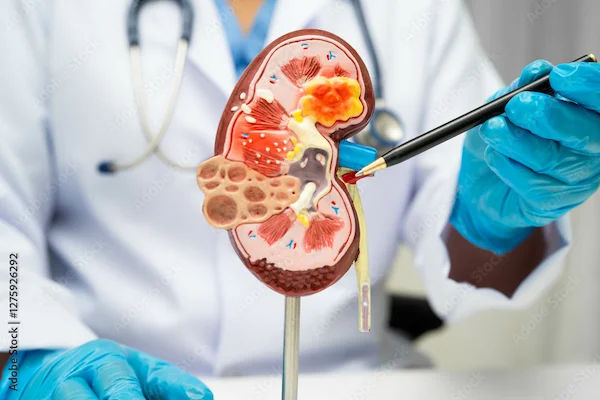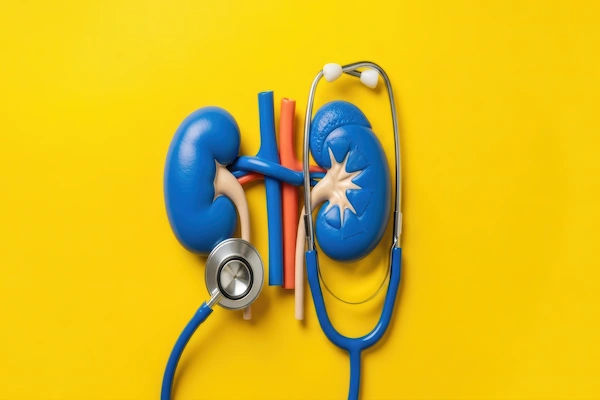Kidney Transplant Without Removing Old Kidney
Getting a kidney transplant? Learn why your old, diseased kidneys are usually left in place, where the new donor kidney is positioned, and the benefits of this common approach.

Written by
Last updated on 13th Jan, 2026

Introduction
If you or a loved one is considering a kidney transplant, you may have heard about a procedure where the new kidney is placed without removing the old one. This approach, known as a "kidney transplant without nephrectomy," is becoming more common and can be beneficial for certain patients.
In this article, we’ll explain:
What is this procedure?
Who can benefit from it?
How does it differs from traditional transplants?
What to expect before and after surgery?
Lifestyle tips for a healthy recovery?
What Is a Kidney Transplant Without Removing the Old Kidney?
Traditionally, a kidney transplant involves removing the failed kidneys before placing the new, healthy kidney. However, in some cases, doctors may decide to leave the old kidneys in place and simply add the new kidney.
Why Keep the Old Kidney?
Why one decides to keep the old kidney lie upon these various reasons:
Less invasive surgery – Removing the old kidney (nephrectomy) is an additional procedure that can increase risks.
Preserving residual kidney function – Some patients still produce small amounts of urine, which can help with fluid balance.
Avoiding complications – If the old kidneys are not causing infections, pain, or high blood pressure, removing them may not be necessary.
Who Is Eligible for This Type of Transplant?
Not everyone is a candidate for keeping their old kidneys. Doctors consider factors like:
No severe infections – If the old kidneys are infected (e.g., recurrent UTIs or kidney stones), they may need removal.
No uncontrolled high blood pressure – Some failed kidneys still produce hormones that raise blood pressure.
No cancerous or cystic kidneys – Polycystic kidney disease (PKD) or tumors may require removal.
Sufficient space – The new kidney is placed in the lower abdomen, so there must be enough room.
Your nephrologist and transplant surgeon will assess whether this approach is right for you.
How Is the Surgery Performed?
The procedure is similar to a standard kidney transplant but skips the nephrectomy step:
Anesthesia – You’ll be asleep during the surgery.
Incision – A small cut is made in the lower abdomen.
Placement of the new kidney – The donor kidney is connected to your blood vessels and bladder.
Closing the incision – The wound is stitched up, and you’ll be monitored in recovery.
Benefits of This Approach
Shorter surgery time (no need to remove the old kidney).
Less pain and faster recovery.
Lower risk of bleeding or infection from an additional procedure.
Consult Top Specialists for Personalised Tips
Recovery and What to Expect After Surgery
Recovery and what to expect after recovery include:
Immediate Post Surgery Care
Hospital stay: Typically 5–7 days.
Pain management: You’ll be given medications to keep you comfortable.
Monitoring: Doctors will check kidney function, blood pressure, and signs of rejection.
Long-Term Care
Immunosuppressants: You’ll need lifelong antirejection medications.
Regular checkups: Blood tests and doctor visits to ensure the new kidney is working well.
Infection prevention: Since immunosuppressants weaken your immune system, hygiene and vaccinations are crucial.
Lifestyle Tips for a Healthy Kidney Transplant
To keep your new kidney functioning well:
Stay hydrated – Drink enough water unless your doctor advises otherwise.
Eat a balanced diet – Focus on lowsodium, lowsugar, and kidneyfriendly foods.
Exercise regularly – Light activities like walking help with recovery.
Avoid smoking and alcohol – These can harm your kidney and interact with medications.
Take medications on time – Missing doses can lead to rejection.
When to See a Doctor?
Contact your transplant team if you notice:
Fever or chills (sign of infection).
Swelling, pain, or reduced urine output.
High blood pressure or sudden weight gain.
Can You Book a Consultation for a Kidney Transplant?
If you or a loved one is considering a kidney transplant, Apollo24|7 offers expert consultations with nephrologists and transplant specialists. You can:
Schedule a virtual or in person appointment
Get personalized advice on transplant options
Manage post transplant care effectively
Book your consultation today and take the first step toward better kidney health!
Final Thoughts
A kidney transplant without removing the old kidney can be a safer and simpler option for some patients. If you’re exploring transplant options, discuss this possibility with your doctor to see if it’s right for you.
With proper care, a successful transplant can give you a new lease on life—free from dialysis and full of possibilities.
Consult Top Nephrologist
Consult Top Specialists for Personalised Tips

Dr. Manju Kamal
Nephrologist
12 Years • MBBS,MD(General Medicine), DNB,DM(Nephrology)
Angamaly
Apollo Hospitals Karukutty, Angamaly

Dr. Boddanapu Mastan Valli
Nephrologist
9 Years • M.D, D.M.
Nellore
Apollo Speciality Hospitals, Nellore
Dr. Nithyashree Nandagopal
Nephrologist
10 Years • DNB (Gen Med), DNB (Nephrology)
Chennai
Apollo Hospitals Greams Road, Chennai
(275+ Patients)

Dr. Pardha Saradhi
Nephrologist
9 Years • MBBS, MD-DNB (Gen. Med.), DNB (Nephro)
Hyderabad
Apollo Hospitals D R D O kanchanbagh, Hyderabad
(75+ Patients)

Dr. Kity Sarkar
Nephrologist
15 Years • MBBS,MD(Genl. Med.), DrNB(NEPHROLOGY)
Kolkata
Dr. Kity Sarkar's Clinic, Kolkata
Consult Top Nephrologist

Dr. Manju Kamal
Nephrologist
12 Years • MBBS,MD(General Medicine), DNB,DM(Nephrology)
Angamaly
Apollo Hospitals Karukutty, Angamaly

Dr. Boddanapu Mastan Valli
Nephrologist
9 Years • M.D, D.M.
Nellore
Apollo Speciality Hospitals, Nellore
Dr. Nithyashree Nandagopal
Nephrologist
10 Years • DNB (Gen Med), DNB (Nephrology)
Chennai
Apollo Hospitals Greams Road, Chennai
(275+ Patients)

Dr. Pardha Saradhi
Nephrologist
9 Years • MBBS, MD-DNB (Gen. Med.), DNB (Nephro)
Hyderabad
Apollo Hospitals D R D O kanchanbagh, Hyderabad
(75+ Patients)

Dr. Kity Sarkar
Nephrologist
15 Years • MBBS,MD(Genl. Med.), DrNB(NEPHROLOGY)
Kolkata
Dr. Kity Sarkar's Clinic, Kolkata




_6.webp)